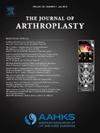门诊手术中心全关节置换术当天出院患者选择算法建议。
IF 3.4
2区 医学
Q1 ORTHOPEDICS
引用次数: 0
摘要
导言:为当天出院的全关节成形术(TJA)确定合适的患者对于维持最佳的患者安全和疗效至关重要。本研究调查了一家非卧床手术中心(ASC)当天出院的 TJA 患者的治疗效果,并根据调查结果和现有文献提出了一种 TJA 患者选择算法:方法:在2019年7月至2021年10月期间,对660名患者进行了回顾性病历审查,所有患者均在一家ASC接受了初级TJA手术。记录了每位患者的当日成功出院(SDD)、手术时间(LOS)、估计失血量(EBL)、并发症和再入院事件。在331例初次全膝关节置换术(TKAs)中,共出现20例并发症(6.0%);在329例初次全髋关节置换术(THA)中,共出现15例并发症(4.6%):TKA患者中有1例直接入院,THA患者中有4例直接入院,因此TKA的SDD成功率为99.7%,THA为98.8%,总体为99.2%。在TKA队列中,体重指数(BMI)与总并发症(r = -0.15,P = 0.006)、伤口并发症合并症(P = 0.006)相关,而EBL与再入院(r = 0.30,P < 0.001)、翻修手术(r = 0.12,P = 0.04)和总并发症(r = 0.16,P = 0.03)相关。在THA队列中,BMI与伤口并发症呈弱相关(r = -0.12,P = 0.02),EBL与急诊就诊率(r = 0.18,P = 0.002)和总并发症(r = 0.14,P = 0.01)呈弱相关。然而,所分析的任何特征与直接入院之间都没有直接关系:结论:在我们的 ASC 队列中,患者的围手术期并发症和入院率都很低,这支持了使用我们提出的循证算法指导患者选择当天出院的 TJA 的安全性。本文章由计算机程序翻译,如有差异,请以英文原文为准。
A Proposed Patient Selection Algorithm for Total Joint Arthroplasty Same-Day Discharge From an Ambulatory Surgery Center
Background
Identifying appropriate patients for same-day discharge (SDD) total joint arthroplasty (TJA) is critical for maintaining optimal patient safety and outcomes. This study investigated patient outcomes after SDD TJA at a single ambulatory surgery center (ASC) and proposes a TJA patient-selection algorithm based on findings and existing literature.
Methods
A retrospective chart review of 660 patients was performed between July 2019 and October 2021 for all patients who underwent primary TJA in a single ASC. Successful SDD, length of surgery, estimated blood loss (EBL), complications, and readmission events were recorded for each patient. There were 20 total complications in 331 primary total knee arthroplasties (TKAs) (6.0%) and 15 total complications in 329 primary total hip arthroplasties (THAs) (4.6%).
Results
There was one direct admission to the hospital in TKA patients and four direct admissions in THA patients, making the successful SDD rate 99.7% in TKAs, 98.8% in THAs, and 99.2% overall. In the TKA cohort, body mass index was associated with total complications (r = −0.15, P = 0.006); comorbidities with wound complications (P = 0.006); and EBL was with readmissions (r = 0.30, P < 0.001), revision surgery (r = 0.12, P = 0.04), and total complications (r = 0.16, P = 0.03). In the THA cohort, body mass index was weakly associated with wound complications (r = −0.12, P = 0.02), EBL was with emergency department visits (r = 0.18, P = 0.002) and total complications (r = 0.14, P = 0.01). However, there was no direct association between any of the analyzed characteristics and direct admission.
Conclusions
In our ASC cohort, patients had low rates of perioperative complications and hospital admissions, supporting the safety of SDD TJA using our proposed evidence-based algorithm to guide patient selection for SDD.
求助全文
通过发布文献求助,成功后即可免费获取论文全文。
去求助
来源期刊

Journal of Arthroplasty
医学-整形外科
CiteScore
7.00
自引率
20.00%
发文量
734
审稿时长
48 days
期刊介绍:
The Journal of Arthroplasty brings together the clinical and scientific foundations for joint replacement. This peer-reviewed journal publishes original research and manuscripts of the highest quality from all areas relating to joint replacement or the treatment of its complications, including those dealing with clinical series and experience, prosthetic design, biomechanics, biomaterials, metallurgy, biologic response to arthroplasty materials in vivo and in vitro.
 求助内容:
求助内容: 应助结果提醒方式:
应助结果提醒方式:


